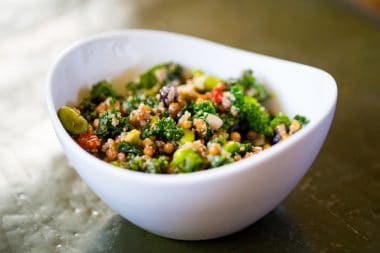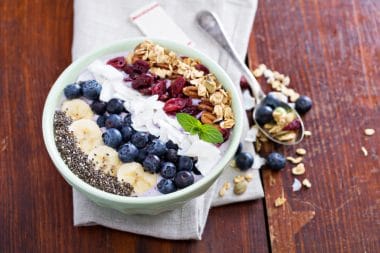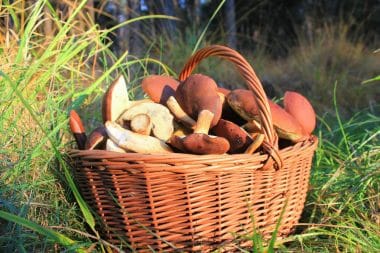Tea–love it or hate it, it’s the most popular drink in the world after water. All true teas come from the Camellia sinensis plant, as opposed to herbal teas, which are made from a wide variety of other plants. The tea plant has been cultivated in China for more than 2,000 years and, more recently, in places like India, Kenya, and Turkey. Some of the highest quality varieties in the world are Chinese tea, grown on land used for centuries to cultivate tea according to traditional organic practices. While tea itself is prepared in a wide variety of ways around the world, there are four main types of tea: black, green, white, and oolong. These four are all made from the Camellia sinensis plant, but the time of harvest and the method of processing is what makes each type so different from the other in terms of taste, color, aroma, nutritional composition, and even health benefits!
Tea has been lauded as a health elixir since humans began to drink it thousands of years ago. In his work Classic of Tea, the first text ever written about tea and produced in the 8th century
CE, Lu Yu writes the following:
“Tea tempers the spirits and harmonizes the mind, dispels lassitude and relieves fatigue, awakens thought and prevents drowsiness, lightens or refreshes the body, and clears the perceptive faculties.”
Naturally, modern medicine has begun to investigate the myriad of benefits that tea drinkers are purported to enjoy. While black tea trumps coffee for its energizing effects and healthier composition, and green tea has been lauded for its antioxidant properties, oolong is still relatively unknown to tea drinkers outside of China and Taiwan. So, what exactly is Oolong tea, and what health benefits does it offer?
What is oolong tea?
Part of the relatively unknown nature of oolong tea comes from its rarity — oolong tea makes up only 2% of the world’s tea cultivation. It’s also relatively new, with records of its cultivation dating back to 1725, during the Qing dynasty. Legend has it that it was discovered when a man named Wu Liang (later renamed Wu Long) was distracted by a deer after harvesting tea, only to return to find the tea leaves oxidized. Oolong teas are traditionally withered under the sun, resulting in oxidization between 5 and 85 percent. The highest quality oolong tea is produced in Fujian province in China, specifically in the Wuyi mountains and Anxi county.
Benefits
Because oolong teas are somewhere between green and black teas, they contain many of the benefits associated with each variety. For example, a lighter, greener variety of oolong will likely have a higher antioxidant level, whereas a more oxidized oolong will have a caffeine boost similar to a black tea. Vitamin-rich oolongs contain calcium, manganese, copper, carotene, selenium, potassium, and vitamins A, B, C, E, and K, as well as folic acid. The following are some of the health benefits you can expect from regularly consuming oolong tea.
- Mental Alertness
Tea has been used for centuries as an aid for concentration and alertness. Buddhist monks reportedly first used tea to help them stay refreshed and awake during long meditation sessions. The caffeine in oolong tea stimulates your central nervous system, making you more alert, while theanine, a key amino acid in tea, helps to relieve anxiety, providing a smoother, less jittery boost than other caffeinated beverages.
- Weight Loss
The metabolism-boosting properties of oolong can help individuals struggling to lose weight. Research from the USDA has shown that tea drinkers burn more calories on a daily basis than water drinkers because a cup of tea will have your body processing faster for about two hours. Oolong tea has also been shown to lower blood sugar levels, and is, therefore, useful in treating diabetes. Oolong tea’s unique flavor is also a boon for sweet tea lovers; since it’s not as bitter as black or green tea, it’s easier to consume without sugar. If you do opt for a sweetener, try to choose one with a lower glycemic index.
- Heart Health
Because it’s partially oxidized, oolong tea contains polyphenols, valuable micronutrients that play a role in maintaining healthy cholesterol levels. The polyphenols in oolong tea help to activate the enzyme lipase, responsible for burning body fat. By helping to keep your cholesterol in check, drinking oolong tea can lower your risk of heart disease.
- Cancer Prevention
The antioxidant properties of oolong may also have a role in limiting the cell mutations that can cause cancer. Regularly drinking oolong tea can lower the risk of ovarian, lung, esophageal, pancreatic, liver, and colorectal cancers.
- Bone Health
Regular consumption of oolong tea can also promote bone mineral density over time. This can help prevent osteoporosis in old age and is one of the reasons regular tea drinkers report feeling healthier and remain more active as they age.
- Healthier Skin and Hair
Patients with eczema have had some success with oolong tea, as its polyphenols act as anti-allergic compounds. Drinking three cups a day can reduce irritation and inflammation, and may leave your skin with a healthier glow. Similarly, oolong tea can help regulate the hormone that controls hair growth, preventing hair loss and maintaining lustrous hair.
Preparing Oolong Tea
High-quality oolong tea has a complex flavor and the tea is delicious. It can be consumed in any number of ways. Typically, you should steep your oolong tea in boiling water for 2 to 5 minutes, depending on the desired strength, and drink it hot or cool it to drink as an iced tea later. Oolong tea, like many Chinese teas, can be steeped between two and five times. The second steeping is rumored to have a superior flavor and less caffeine!
Final Considerations
As with all caffeinated beverages, oolong tea should be consumed in moderation. Experts recommend consuming two to three cups a day, one in the morning and one in the afternoon. Caffeine-sensitive individuals may experience nausea or have trouble sleeping if they consume too much. Similarly, tea should be consumed apart from food, as it may block the absorption of iron from plant foods.
That being said, oolong tea is still a bit of a hidden gem within the tea world and presents a myriad of benefits. Whether you’re a tea connoisseur in pursuit of superior flavor, or simply looking for a healthy boost, pour yourself a cup of oolong tea and enjoy!








Reply